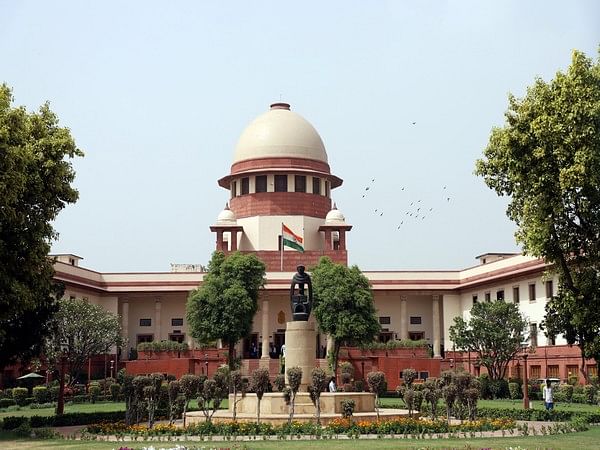New Delhi [India] June 4 (ANI): A plea was filed in the Supreme Court on Saturday challenging a provision of the National Commission for Minorities (NCM) Act and seeking a direction to lay down guidelines for the identification of minorities at the district level.
The petition was filed by Mathura-resident Devkinandan Thakur sought to declare the notification on the minority communities, issued by the government on October 23, 1993, as arbitrary, irrational and contrary to Articles 14, 15, 21, 29, and 30 of the Constitution.
The plea stated that on May 17, 1992, the Act came into effect and by using unbridled power under section 2(c), the Centre arbitrarily notified five communities namely Muslims, Christians, Sikhs, Buddhists and Parsis as minorities at the national level against the spirit of the TMA Pai ruling of the top court.
The apex court in the TMA Pai case had said that for the purposes of Article 30 which deals with the rights of minorities to establish and administer educational institutions, religious and linguistic minorities have to be considered state-wise.
Under Section 2(c) of the National Commission for Minorities Act, 1992, the Centre had in 1993 notified five communities — Muslims, Sikhs, Buddhists, Parsis and Christians — as minorities.
“Followers of Judaism, Bahaism and Hinduism; who are real minorities in Ladakh, Mizoram, Lakshadweep, Kashmir, Nagaland, Meghalaya, Arunachal Pradesh, Punjab, Manipur, cannot establish and administer educational institutions of their choice because of non-identification of ‘minority’ at the state level, thus jeopardizing their basic rights guaranteed under Article 29-30,” the plea added.
“Followers of Judaism, Bahaism and Hinduism are being deprived of their basic rights to establish and administer educational institutions of their choice. On the other hand, Muslims are in majority in Lakshadweep (96.58 per cent) and Kashmir (96 per cent) and there is a significant population in Ladakh (44 per cent), Assam (34.20 per cent), Bengal (27.5 per cent), Kerala (26.60 per cent), UP (19.30 per cent) and Bihar (18 per cent) and (they) can establish and administer educational institutions of their choice,” it said.
The PIL said that Christians are a majority in Nagaland (88.10 per cent), Mizoram (87.16 per cent) and Meghalaya (74.59 per cent), and there is a significant population in Arunachal, Goa, Kerala, Manipur, Tamil Nadu and West Bengal and they can also establish and administer educational institutions of their choice.
Likewise, Sikhs are a majority in Punjab and there is a large population in Delhi, Chandigarh, and Haryana, but they can establish and administer, it added. Similarly, Buddhists are a majority in Ladakh but they can establish and administer educational institutions of their choice, the plea further said.
“Hindus are merely 1 per cent in Ladakh, 2.75 per cent in Mizoram, 2.77 per cent in Lakshadweep, 4 per cent in Kashmir, 8.74 per cent in Nagaland, 11.52 per cent in Meghalaya, 29 per cent in Arunachal Pradesh, 38.49 per cent in Punjab, 41.29 per cent in Manipur but the Centre has not declared them ‘minority’, thus Hindus are not protected. Articles 29-30 and cannot establish and administer educational institution of their choice,” it said.
By using unbridled power under the Act, the Centre has arbitrarily declared Muslims, who are 96.58 per cent in Lakshadweep, 95 per cent in Kashmir and 46 per cent in Ladakh, as a minority, it added.
“In 2014, Jains were added in the list as sixth minority, though the three judges’ bench of this Court in Bal Patil Case (2005 verdict) had very categorically refused to grant minority status to Jains,” it said.
It added that after the judgment in the TMA Pai case (2002), the legal position is very clear that the unit for determining status of linguistic and religious minorities would be State.
A similar plea filed by advocate Ashwini Upadhyay is pending before the apex court in which it had granted three months time to the Central government to hold consultations with various State governments on the issue of granting minority status of Hindus in states where they are outnumbered by other communities. (ANI)
This report is auto-generated from ANI news service. ThePrint holds no responsibility for its content.



